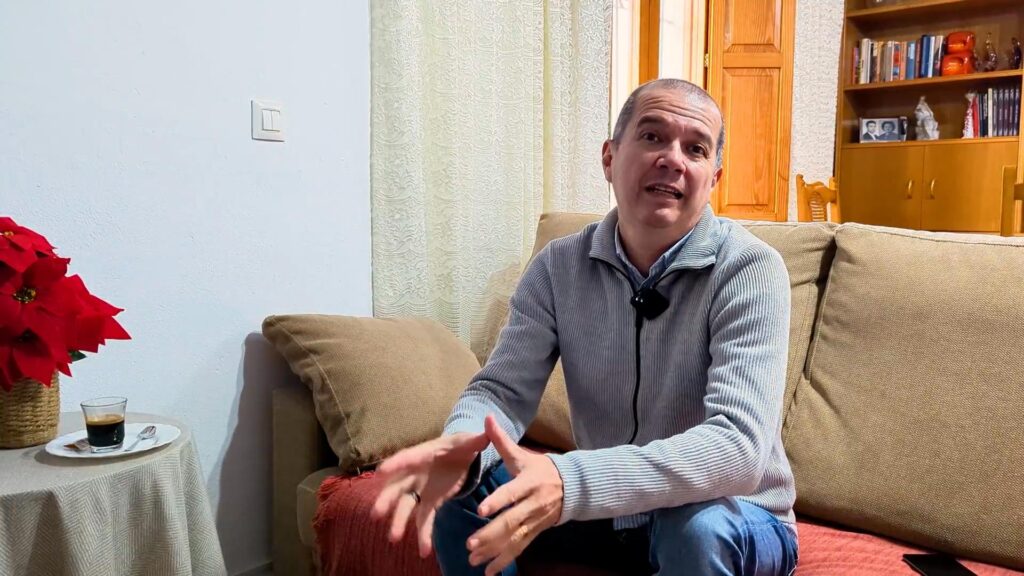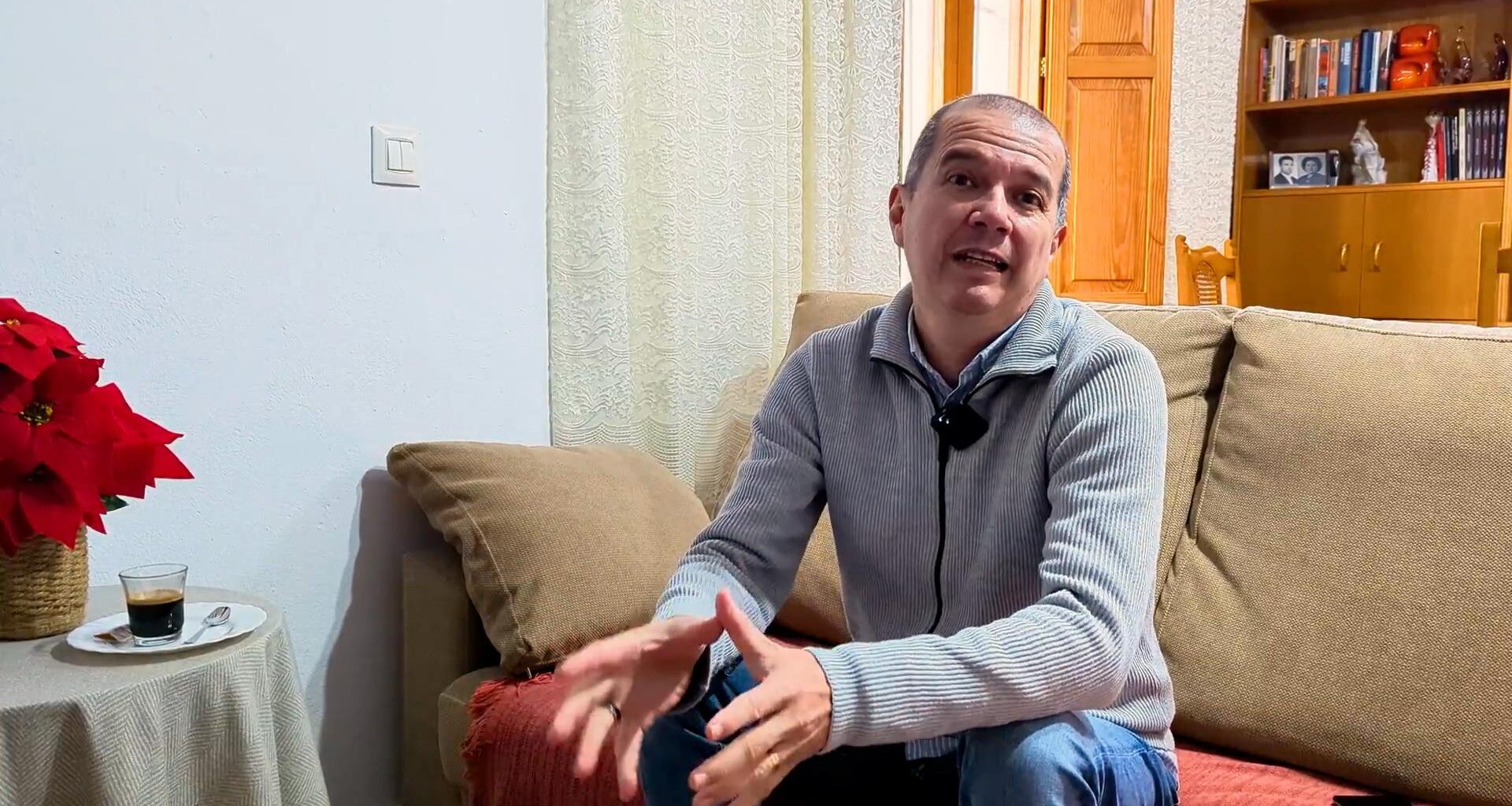
Colombian Harold Rios, who has been living in Spain for 25 years, runs the successful Casa del Nono restaurant in Murcia. Credit: Josep Maria Freixes / ColombiaOne.
Casa del Nono is a successful restaurant run by a Colombian in Cartagena, Spain. Its owner, Harold Wilson Rios, was born in the city of Pereira, Colombia, but emigrated to Spain when he was very young in order to seek his fortune.
That was more than twenty years ago. Today, together with his family, Rios runs a restaurant near the beach in Isla Plana, Cartagena, in the Spanish region of Murcia.
However, the road to success was hard. Rios worked for years as a waiter, and even as a bricklayer during Spain’s real estate boom, before finally managing to turn Casa del Nono into the successful business it is today.
Colombia One interviewed Rios while he was on vacation. Every two years, he and his family go back to Colombia to visit. This year, however, he is staying in Spain. As such, he was able to welcome us into his home to interview him over a coffee – which, of course, was Colombian.
Surviving in Spain, doing whatever it takes
In Colombia, the verb “rebuscar” means to forage for opportunities or to do whatever it takes to get by and make a living. This is exactly what Rios did during his first years in Europe.
“I came [to Spain] on May 18, 2000, as an adventure, with three friends. The plan was to be here for two years, but I’ve been here for 25,” explains Rios, who still has a Paisa accent, despite spending a quarter of a century away from his homeland.
Rios arrived, like many of his fellow countrymen, in Madrid, where he was welcomed by some friends who were living in the Spanish capital at the time. However, his destiny was not to stay there, and traveled to a town called Font de La Figuera, in the southern region of Valencia.
Despite having only 2,000 inhabitants, Rios had some friends in Font de La Figuera who took him in. “We spent a month getting to know the place,” he says, although it didn’t take long for him and his two companions to start working as waiters. “We were there for five years, working in a roadside restaurant,” he recalls.
Rios did everything he could to survive in Font de La Figuera and fulfill his dream of staying in Spain. In the face of adversity, and with each obstacle he encountered, his determination to achieve this goal grew stronger.
In his first few years in Valencia, in the 2000s, Spain was experiencing a construction boom. Rios therefore learned another trade and started working as a tiler, looking for a better income by taking advantage of the numerous real estate developments happening at the time.
“I learned the trade because I didn’t know anything else,” he confesses, recalling that at the time, there was work in construction “every three meters.” However, in 2008, three years after starting his new job, crisis hit the Spanish economy and Harold lost his job.
Casa del Nono restaurant: the culmination of two decades of work by a Colombian in Spain
Rios was again faced with the question of what to do next in order to make a living. Soon, he found an answer: working as a waiter once again, at the Casa del Nono restaurant, in Cartagena, some 200 kilometers south of Font de la Figuera.
A family restaurant, Casa del Nono was established in 1954 and has a long history in Isla Plana, an area near Cartagena’s beach.
The opportunity to resume work as a waiter was a golden opportunity for Rios. His wife had also emigrated to Spain a few years earlier, and he needed to find a job to support her and their children.
Harold Rios, originally from Colombia, has been running the Casa del Nono restaurant in Cartagena, Spain, for the past five years. Credit: Josep Maria Freixes / ColombiaOne.
Ten years later, the owner of Casa del Nono decided to retire. “He told me that he wanted me to take over the restaurant,” Rio recalls with pride.
“It was easy for me because I had been running the business together with my boss for ten years,” Rios says of becoming manager of the eatery. While he oversees operations, he says that five years on, many customers do not even know that he is now the owner as he has wanted to keep the business and the menu as it was previously.
The restaurant has always been known for its stone-grilled meat. It is “old beef tenderloin; thin slices [of meat] that are served to the client with a stone,” he explains. He adds that the dish arrives at the table still smoking, “so that each diner can taste it as they like: with various types of salt.” According to Rios, the dish “is spectacular.”
The difficulty of migrant life
Despite having lived in Spain for 25 years, Rios admits that being a migrant is often hard. “Life abroad is not easy,” he acknowledges before saying that preparation is the best way to overcome the challenges inherent to moving abroad.
“The fundamental thing is to prepare before leaving,” he advises those who seek to improve their lives and fulfil their dreams by moving abroad.
He admits that the distance between him and his and his relatives in Colombia is the main sacrifice that he has had to make as an immigrant. “I miss my parents a lot,” he says, admitting that he wishes they had more opportunities to spend time with his children.
Today, he is at least able to return to Colombia fairly regularly. In the past it was much more difficult due to a lack of time off from work. “I didn’t go to Colombia for 14 years and during that time my four children were born,” Rio says, recalling that it was also difficult to travel with small children.
As for the future, Rio is unsure whether he will eventually return to Colombia. “I am getting more and more comfortable here, but I feel more and more Colombian,” he reflects, encapsulating the age-old dilemma of those who come from one place, but who make a life in another.

